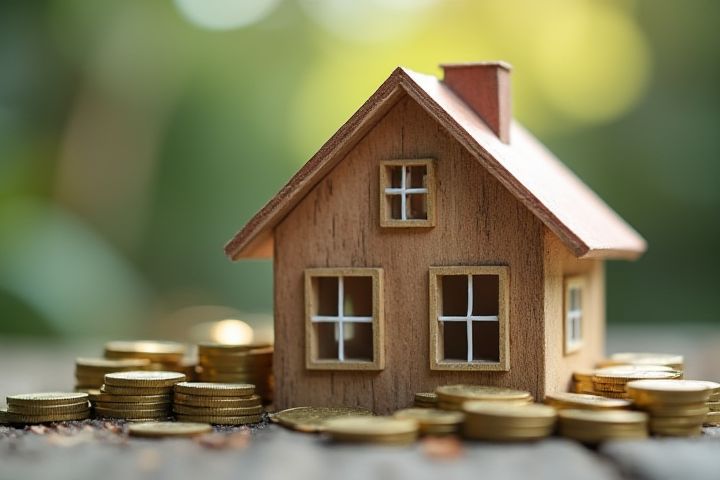
A house serves as a tangible asset that often appreciates over time, typically outpacing inflation. Homeownership can provide you with a sense of stability and security, offering a refuge from the volatility of rental markets. Moreover, purchasing a home allows you to build equity; as you pay down the mortgage, your ownership stake increases, potentially leading to significant financial gains. Tax benefits, such as the mortgage interest deduction, can further enhance the financial advantages of owning property. In addition to serving as a personal residence, a house can be leveraged for rental income, diversifying your investment portfolio.
Why Is A House A Good Investment
Potential for appreciation
Investing in a house offers significant potential for appreciation, often outpacing inflation rates over time. Historically, residential properties have shown a consistent average annual return of around 3-5%, depending on the market and location. In metropolitan areas, rapid job growth and population increase can lead to even greater demand, resulting in higher property values. By purchasing a home, you not only secure a place to live but also an asset that can appreciate substantially, adding to your overall net worth.
Equity building
Investing in a house is an effective strategy for equity building, as each mortgage payment contributes to increasing your ownership stake in the property. Over time, appreciation of the real estate market further enhances the value of your investment, resulting in a growing net worth. You can leverage this equity by accessing home equity loans or lines of credit to finance other opportunities, such as renovations or education. Moreover, as housing demand increases, the potential for profit when selling your home amplifies, making it a sound financial asset for long-term wealth accumulation.
Tax benefits
Owning a house provides significant tax benefits that can enhance your overall financial health. Homeowners can deduct mortgage interest payments, which can lead to considerable savings, especially in the early years of a mortgage. Property taxes are also deductible, allowing you to reduce your taxable income based on the amount paid each year. Furthermore, when you sell your primary residence, you might exclude up to $250,000 in capital gains ($500,000 for married couples), making it an attractive long-term investment option.
Rental income opportunity
A house offers a compelling investment opportunity due to the potential for consistent rental income. By purchasing a property in a desirable location, you can attract reliable tenants, ensuring a steady cash flow that can cover mortgage payments and property maintenance. Additionally, with the growing demand for rental properties, your investment can appreciate in value over time, providing both short-term revenue and long-term equity gain. Utilizing platforms to manage your rental efficiently can enhance profitability and streamline tenant communication, maximizing your overall investment return.
Hedge against inflation
A house serves as a robust hedge against inflation due to its potential for value appreciation over time. Historically, real estate has increased in value at an average rate of about 3-5% annually, often outpacing inflation rates. As the cost of living rises, property values and rental income typically follow suit, allowing homeowners to protect their purchasing power. Furthermore, with fixed-rate mortgages, your monthly payments remain stable even as prices rise, adding an extra layer of financial security.
Forced savings mechanism
A house serves as a powerful forced savings mechanism, as mortgage payments compel you to allocate a portion of your income towards building equity over time. Unlike renting, where payments contribute to a landlord's profit, a mortgage invests in your future financial security and asset growth. As property values typically appreciate, your initial investment can yield significant returns, boosting your net worth. Moreover, homeowners often benefit from tax deductions on mortgage interest, further enhancing the financial advantages of owning real estate.
Sense of stability
Investing in a house often provides a profound sense of stability, allowing you to establish roots within a community. Homeownership offers a consistent living environment, shielding you from the fluctuations of rental markets and evictions. This stability can enhance your emotional well-being, fostering a sense of security and belonging. Moreover, as property values typically appreciate over time, your home becomes not just a place to live, but a solid financial asset contributing to your long-term wealth.
Customization freedom
A house offers unparalleled customization freedom, allowing you to tailor every aspect to your preferences and lifestyle. From choosing paint colors to selecting flooring and fixtures, the possibilities are virtually limitless, enhancing your sense of ownership. Home modifications, such as adding a deck or renovating a kitchen, can increase property value significantly, often exceeding 20% ROI. This level of personalization not only makes your living space uniquely yours but also contributes to long-term financial gains.
Pride of ownership
Owning a house cultivates a strong sense of pride of ownership, as it offers a tangible asset that can appreciate over time. This emotional and financial investment enhances your connection to the property, transforming a mere structure into a cherished home. Homeownership often leads to a deeper engagement with your community, as you become more invested in local events and improvements. Furthermore, this pride can motivate you to maintain and enhance your home, contributing to its long-term value and ensuring it remains a worthwhile investment.
Diversification of assets
Investing in a house provides an excellent opportunity for diversification of assets, allowing you to spread your financial risk across different markets. Real estate typically appreciates over time, often outpacing inflation rates, which can significantly enhance your portfolio's overall value. In 2023, the average U.S. home value increased by 10%, showcasing the potential for substantial returns on investment. By including real estate in your asset allocation, you reduce your vulnerability to stock market fluctuations and create a more stable financial future.
